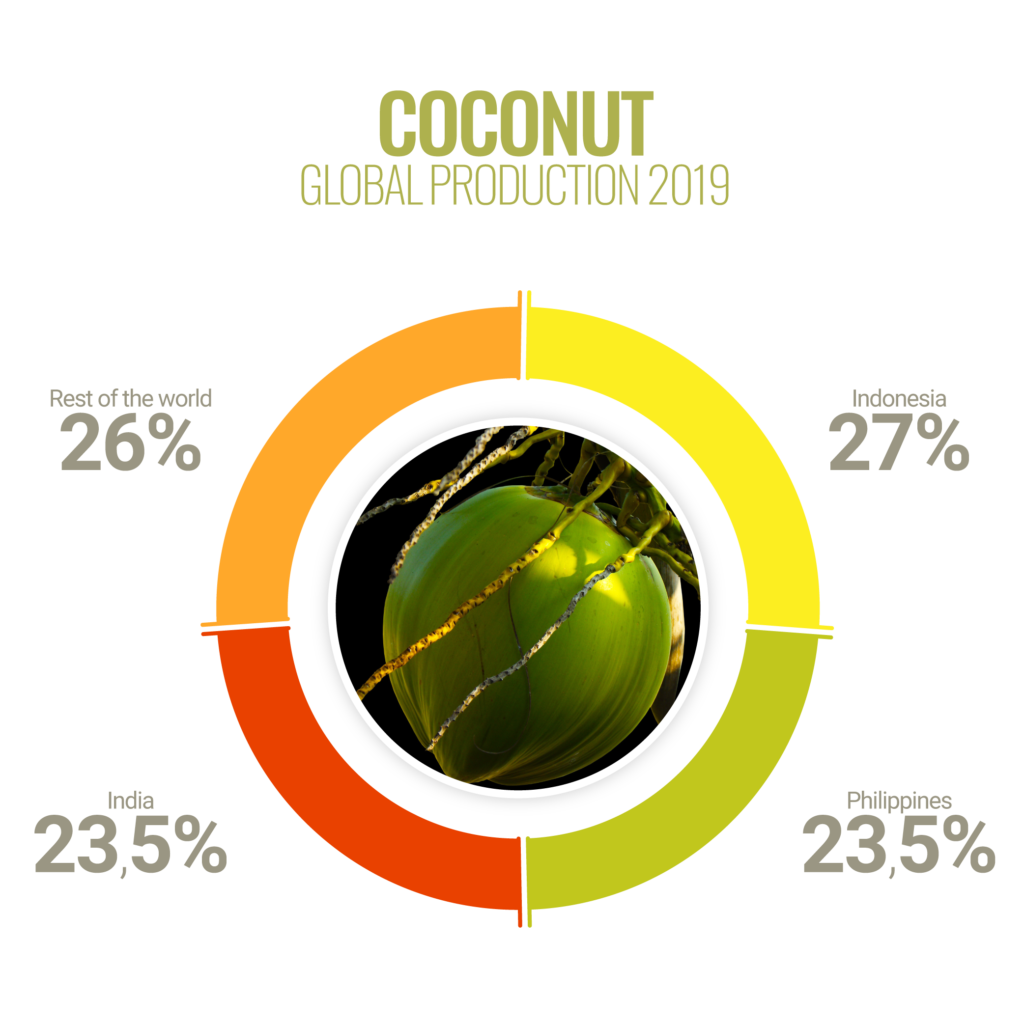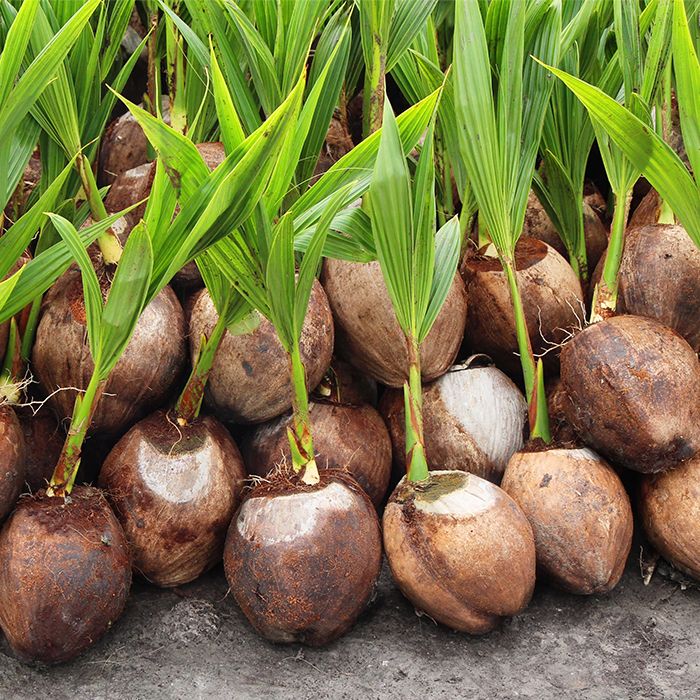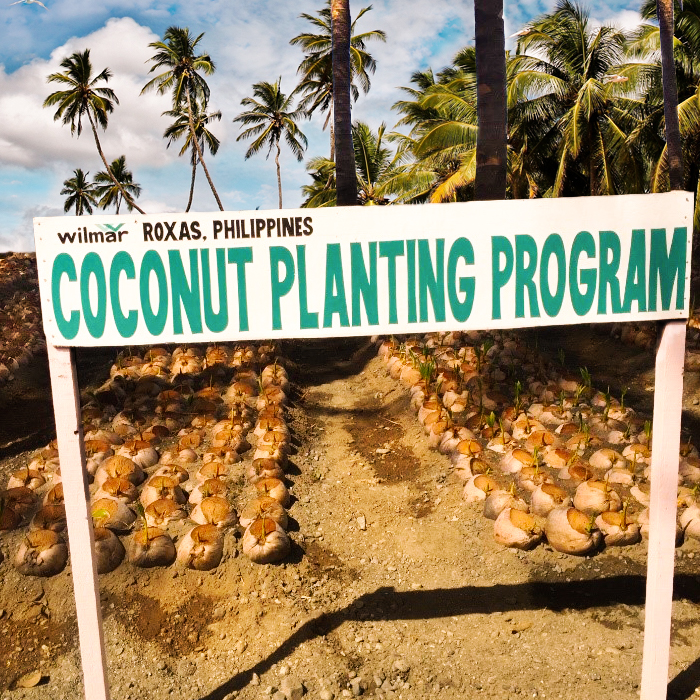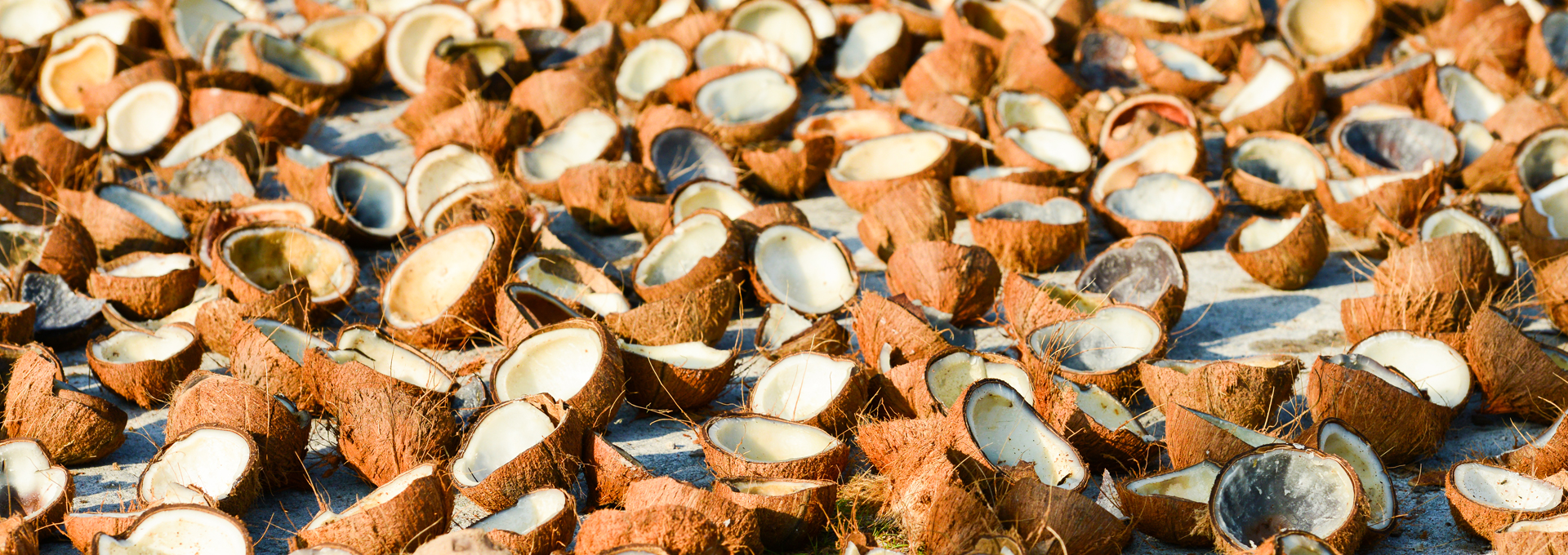sourcing coconut oil
Coconut palm trees grow in the tropics, and their oil is predominantly produced in The Philippines, Indonesia, and India. The crops are mostly grown by smallholder farmers (millions) and crushed locally.
Our founding shareholder, Wilmar, is an important coconut oil supplier to Olenex and sources the oil mainly from The Philippines and Indonesia. Unlike the palm and soy supply chains, no global sustainability or standard-setting platform exists in the coconut supply chain.

The approach to sustainable coconut oil
Our goal is to get closer to the local indigenous coconut farmers and create a mutual understanding of sustainable production and processing. It has enabled us to support them in their sustainability transformation on the ground. To achieve the change, Olenex takes a two-tier approach:
- Tier 1: Social and environmental programmes in the proximity of Wilmar’s processing facilities.
- Tier 2: Sector approach to protect children’s rights in the coconut oil supply chain.
Coconut Sustainability Update
Environmental and social sustainability programmes
Wilmar coconut responsibility
A major supplier of the Olenex coconut oil supply chain is Wilmar. The Olenex parent company operates coconut processing facilities at two locations in the Philippines, Roxas and Gingoog. Both facilities have long-standing sustainability programmes in place, benefiting adjacent communities and the environment.

Rejuvenation Programme
Ageing trees, poor tree management, as well as pests and diseases have adverse effects on coconut (copra) supply. This is a threat to the coconut industry and farmers’ income. The rejuvenation programme aims to replace older trees with new ones to sustain the production of copra while supporting farmers to increase their income.
The Philippine Coconut Authority (PCA) supports the selection of good quality seed material. Wilmar has established its first coconut seedling nursery in 2014 to accommodate at least 10,000 seedlings. Since then, Wilmar has continuously dispersed free coconut seedlings to farmers in the provinces of Zamboanga del Norte and Misamis Oriental. To date, more than 155,000 seedlings were donated to farmers. The availability of free coconut seedlings encourages farmers to rejuvenate their ageing coconut plantations.

Nutrition Programme
Poverty is the primary reason for malnutrition. Wilmar has initiated a nutrition programme in 2014. Meanwhile, six schools have been added to the programme. During the school year 2019/2020, a total of 3,902 students have been helped, improving their food intake. To supplement their nutrition, school children receive an additional, healthy meal once a week. Both parents and teachers are taking care of the food preparation.
The local community, government, parents, and the Department of Education are widely supporting the initiative as it contributes to the overall welfare of the population.
The principal of Minang Elementary School said that “no words can express their happiness and gratitude” when her school was selected for the programme. Minang Elementary School has one of the highest records of malnutrition in the region. With the support of the Wilmar nutrition programme, Minang was able to reduce the number of malnutrition cases considerably.
Healthcare Programme
Wilmar established two healthcare centres close to its processing facilities serving nearby communities. Wilmar Community Healthcare Clinics are privately owned and provide healthcare services to rural neighbours who in the past lacked regular access to basic healthcare. The clinics offer free medical consultation, health care, basic/generic medicine as well as first aid in emergency cases. The clinics are staffed with licensed physicians to conduct medical check-ups. Full-time nurses and midwives complement the staffing. The clinics also aim to increase awareness and prevention of disease through patient education and counselling. Since its establishment in 2014, the two clinics served more than 60,000 patients.
DUE DILIGENCE IN THE COCONUT SUPPLY CHAIN
Recently, a new project initiated by MVO – the Netherlands Oils and Fats Organisation, VERNOF (in particular Cargill and Wilmar as implementation partners), ICCO, Global March against Child Labour, and Verité has started with the help of a subsidy, made available by The Netherlands Enterprise Agency (RVO).

The 4-year project, “Protecting the rights of children in the coconut oil supply chain – The Philippines”, will focus on solving the root problems of children (15-17 years old) who may do unpaid work in hazardous conditions. Additionally, the project aims to develop child labour due diligence systems at sector level in the Netherlands. The initiative will lead to further discussions about the implementation in the entire European region.
Olenex is the European importer of coconut oil produced in the Wilmar factory plants in The Philippines. Being a strong supporter of this programme, we will provide regular progress updates.
More information (in Dutch) is available in the MVO Magazine.
Environmental Programme
Wilmar Philippines engages in the preservation of the ecological balance by planting trees. The objective is to bring noticeable improvement to rural greenery, increase forest cover, reduce greenhouse gas emissions and protect groundwater supplies. In order to achieve these goals, Wilmar offers 1000 Mahogany tree seedlings per month to interested landowners. Mahogany trees are planted by farmers in the boundaries of their farms. Since the inception of the programme in 2008, more than 1.5 million seedlings were distributed for planting in the provinces of Zamboanga del Norte and Misamis Oriental.
Recently the number of planted trees have gone down because of the increased safety risks in the highlands which discouraged farmers to go up and plant trees leading to a decline in planted numbers of trees.

